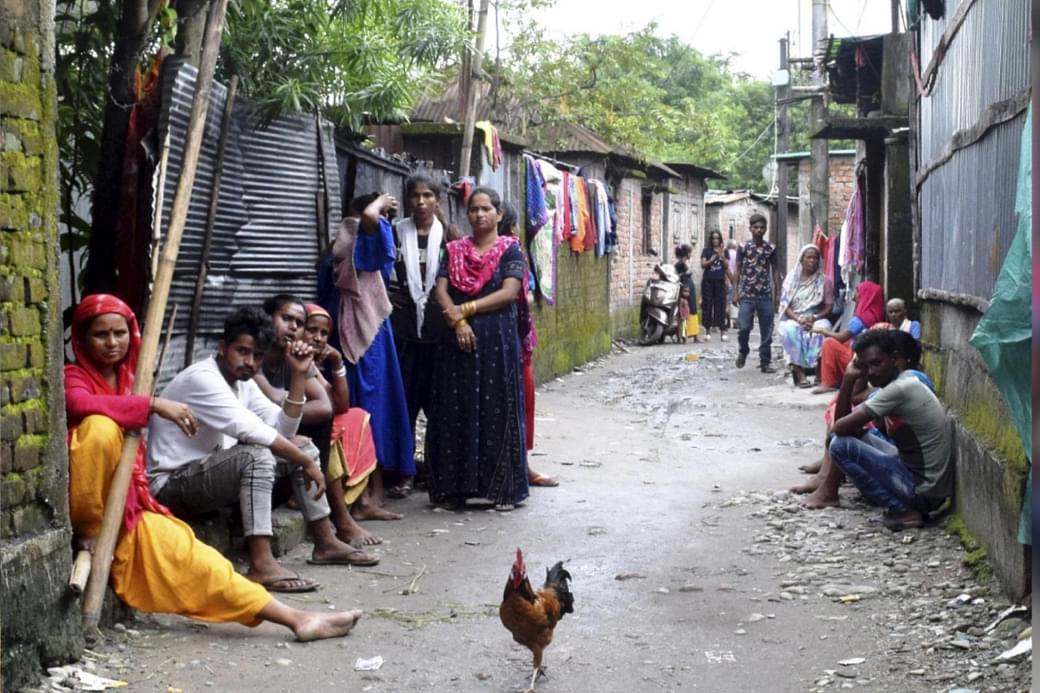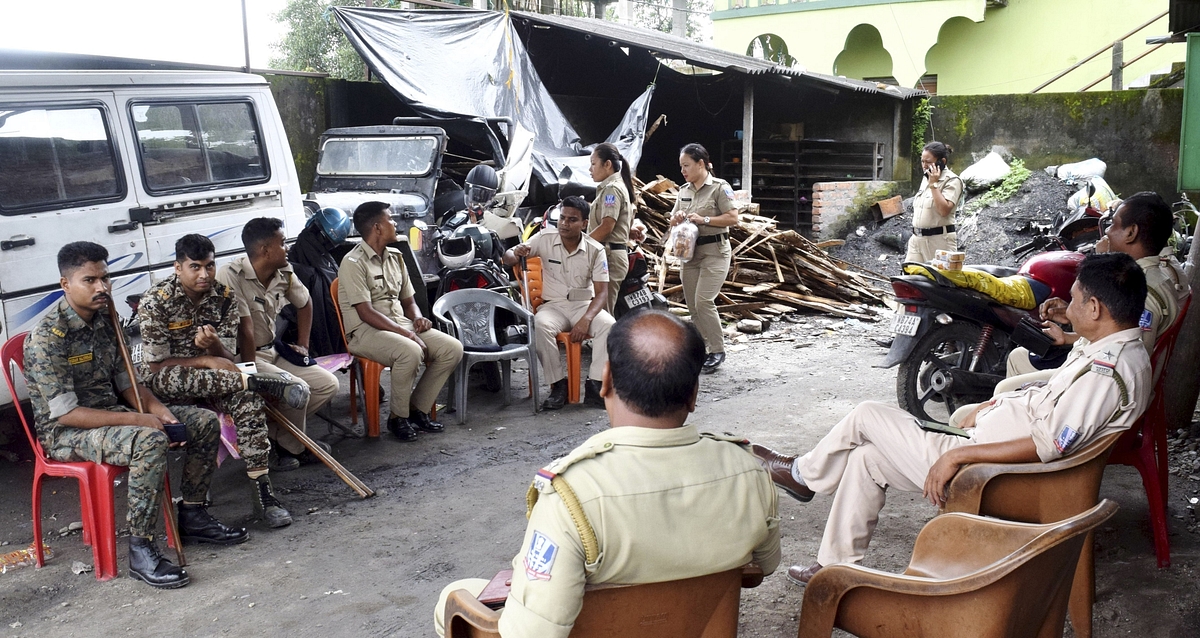A
Aditi Joshi
Guest
Recent days have witnessed a tragic incident in Siliguri, West Bengal, thrusting the region into the spotlight for its complex challenges. The brutal assault and murder of a minor girl exposed the intricate issues surrounding the locality commonly referred to as ‘Chhota Pakistan.’

PC Swarajya
The community was shaken by a heinous crime that unfolded last week in Matigara, Siliguri. A young man named Mohammad Abbas faced arrest for brutally murdering a minor Hindu Gorkha girl. The incident triggered widespread protests and outrage, prompting vehement calls for justice across North Bengal.
Siliguri’s Lenin Colony, popularly known as ‘Chhota Pakistan,’ has gained notoriety due to its association with criminal activities. This grim hamlet, comprising approximately 300 huts and shanties, has witnessed a surge in occurrences like theft, burglary, drug peddling, and even human trafficking. Despite law enforcement efforts, criminal activities continue, raising considerable concerns about public safety.
The challenges within Chhota Pakistan are exacerbated by an influx of illegal immigrants from Bangladesh and Rohingyas. Many of these immigrants engage in criminal activities, leveraging socio-political support offered by local politicians. The unique Bangladeshi dialect spoken by a majority of the residents hints at their origins, while Rohingyas maintain their distinct linguistic identity.
Reports indicate that illegal immigrants have found refuge and assistance through political connections. Some makeshift mosques in the area are allegedly run by illegal Bangladeshi immigrants. They promote a conservative and radical interpretation of Islam.

PC Swarajya
Local residents are growing increasingly concerned about the escalating presence of criminal elements in Chhota Pakistan. Despite law enforcement efforts, drug peddling and other unlawful activities persist without hindrance. The situation is complicated by the area’s affiliation with political power. It makes it difficult for authorities to maintain law and order.
In response to these ongoing challenges, the Bharatiya Janata Party (BJP) has demanded a comprehensive background check of all families residing in Chhota Pakistan. The party argues that identifying and deporting illegal immigrants is essential to address the root issues. However, the ruling Trinamool Congress party dismisses these assertions. They maintain that all inhabitants are Indian citizens.
The demographic landscape of Siliguri and North Bengal has undergone significant changes due to the influx of illegal immigrants. The rising Muslim population, largely comprised of these immigrants. It has led to shifts in the local demographics. This transformation has spurred concerns about cultural dynamics and ignited political debates about immigration policies.
The tragic event in Siliguri has brought to light the intricate challenges posed by the locality known as Chhota Pakistan. Escalating crime rates, immigration concerns, and shifting demographics have given rise to a complex array of issues that warrant attention.
The post Challenges in Siliguri’s ‘Chhota Pakistan’: Crime, Immigration and Demographic Shifts appeared first on The Jaipur Dialogues.
Continue reading...
The Tragic Incident and Local Outrage

PC Swarajya
The community was shaken by a heinous crime that unfolded last week in Matigara, Siliguri. A young man named Mohammad Abbas faced arrest for brutally murdering a minor Hindu Gorkha girl. The incident triggered widespread protests and outrage, prompting vehement calls for justice across North Bengal.
Chhota Pakistan: A Notorious Locale
Siliguri’s Lenin Colony, popularly known as ‘Chhota Pakistan,’ has gained notoriety due to its association with criminal activities. This grim hamlet, comprising approximately 300 huts and shanties, has witnessed a surge in occurrences like theft, burglary, drug peddling, and even human trafficking. Despite law enforcement efforts, criminal activities continue, raising considerable concerns about public safety.
Immigration and Criminal Nexus
The challenges within Chhota Pakistan are exacerbated by an influx of illegal immigrants from Bangladesh and Rohingyas. Many of these immigrants engage in criminal activities, leveraging socio-political support offered by local politicians. The unique Bangladeshi dialect spoken by a majority of the residents hints at their origins, while Rohingyas maintain their distinct linguistic identity.
Political Patronage and Radicalization
Reports indicate that illegal immigrants have found refuge and assistance through political connections. Some makeshift mosques in the area are allegedly run by illegal Bangladeshi immigrants. They promote a conservative and radical interpretation of Islam.
These individuals reportedly wield influence over the neighborhood and impact residents’ voting choices, resulting in an ongoing cycle of criminal activities and political protection.
Challenges to Community Safety

PC Swarajya
Local residents are growing increasingly concerned about the escalating presence of criminal elements in Chhota Pakistan. Despite law enforcement efforts, drug peddling and other unlawful activities persist without hindrance. The situation is complicated by the area’s affiliation with political power. It makes it difficult for authorities to maintain law and order.
BJP’s Call for Action
In response to these ongoing challenges, the Bharatiya Janata Party (BJP) has demanded a comprehensive background check of all families residing in Chhota Pakistan. The party argues that identifying and deporting illegal immigrants is essential to address the root issues. However, the ruling Trinamool Congress party dismisses these assertions. They maintain that all inhabitants are Indian citizens.
Demographic Changes and Implications
The demographic landscape of Siliguri and North Bengal has undergone significant changes due to the influx of illegal immigrants. The rising Muslim population, largely comprised of these immigrants. It has led to shifts in the local demographics. This transformation has spurred concerns about cultural dynamics and ignited political debates about immigration policies.
Conclusion
The tragic event in Siliguri has brought to light the intricate challenges posed by the locality known as Chhota Pakistan. Escalating crime rates, immigration concerns, and shifting demographics have given rise to a complex array of issues that warrant attention.
The post Challenges in Siliguri’s ‘Chhota Pakistan’: Crime, Immigration and Demographic Shifts appeared first on The Jaipur Dialogues.
Continue reading...
